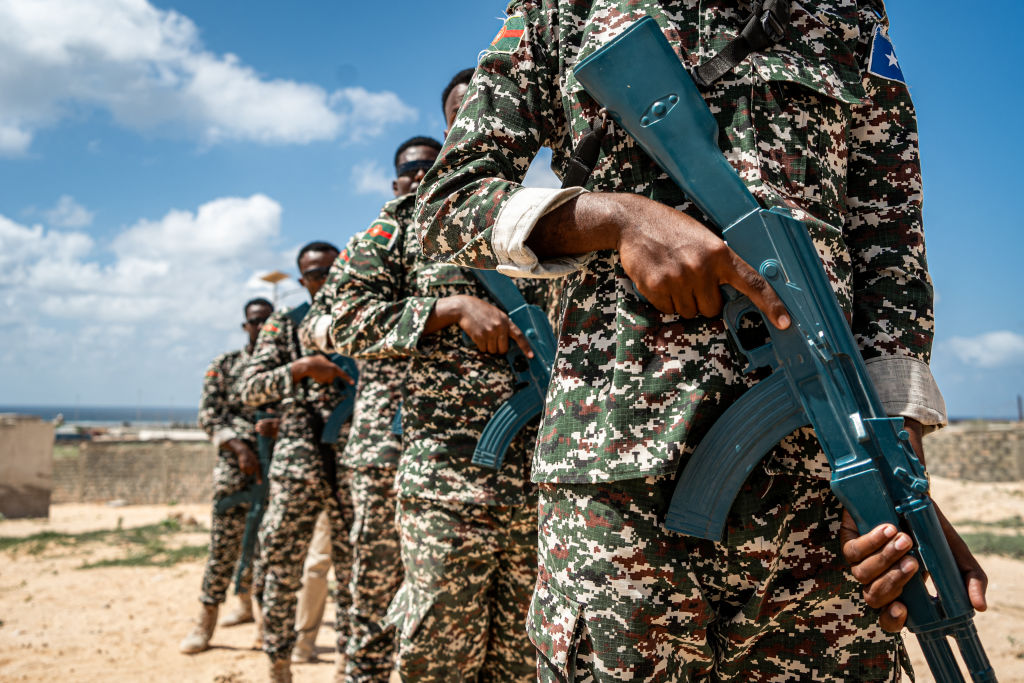With Arms Embargo Lifted, Somalia Urged to Secure Ports, Protect Depots
ADF STAFF
Months after the United Nations Security Council voted to lift a weapons embargo on Somalia, experts are weighing the impact of the move.
For more than 30 years, Somalia was under the embargo that was created to prevent warlords and militias from arming themselves during the nation’s disastrous civil war. It was amended several times over the years in response to the worsening al-Shabaab crisis.
In the final 10 years of the embargo, Somalia needed Security Council authorization to buy or receive certain high-caliber weapons, equipment and vehicles. Officials complained that this put them at a disadvantage to heavily armed terror groups. A 2022 study by the Somali research center the Hiraal Institute found that al-Shabaab spends $24 million per year on weapons.
“You have al-Shabaab, that is able to purchase from the local markets and illegally smuggle these weapons from, say, Yemen or elsewhere,” Hiraal Executive Director Samira Gaid told Voice of America. “And so for them, they have access to anything without any obligations. But on the other hand, the government is restricted.”
Governmental and military officials said the embargo made them unable to properly arm security forces to defend the nation at a time when the African Union was preparing to end its mission in Somalia and hand over full security control to local forces. In December 2023, the U.N. Security Council voted nearly unanimously to fully remove the embargo.
“The lifting of the arms embargo enables us to confront security threats,” said Somalia’s U.N. Ambassador Abukar Dahir Osman. “It also allows us to bolster the capacity of the Somali security forces by accessing lethal arms and equipment to adequately safeguard our citizens and our nation.”
But observers and neighboring countries remain wary of the move. The Hiraal Institute said that if safeguards are not put in place, lifting the embargo risks worsening clan violence. It urged the nation to demonstrate better control over its ports to stop the flow of illegal weapons and called for the Somali National Army to better protect its weapons depots.
“The evidence suggests that the premature lifting of the arms embargo could precipitate a range of adverse outcomes, from intensifying clan conflicts and enabling illicit arms flows to posing broader threats to regional and global stability,” Hiraal wrote in a statement published by The East African.
Most observers agree that the embargo did little to stop the flow of illegal weapons into Somalia.
A 2022 study by the Global Initiative Against Transnational Organized Crime found thriving illicit arms markets in Somalia. The study titled “The Price of Civil War: A Survey of Somalia’s Arms Markets,” found that nearly 95% of illegal small arms on the market were assault rifles and the vast majority, 81%, were manufactured in Russia or China. Researchers also found that despite a government-established weapons and ammunition management system, guns from security force stockpiles were sold on the illicit market.
“In several instances, Somali government weapons have been deployed in attacks by al-Shabaab,” the report found.
Now, with the embargo fully lifted, observers say it is incumbent upon Somali officials to improve monitoring and ensure proper usage of all weapons. Writing for the Somali News Agency, Roble Idle called for “robust mechanisms for arms control including inventory management, tracking and monitoring.”
“The success of leveraging this opportunity depends on the Somali government’s commitment to transparency, accountability, and adherence to human rights standards,” Idle wrote. “Ensuring that weapons are used for legitimate security purposes and are not misappropriated for internal repression or illicit activities is crucial for gaining the trust of the international community.”

